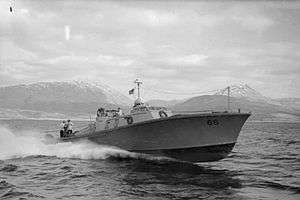Motor Gun Boat

Motor Gun Boat (MGB) was a Royal Navy term for a small military vessel of the Second World War. Such boats were physically similar to Motor Torpedo Boats, (MTBs) but equipped with a mix of guns instead of torpedoes. Their small size and high speed made them difficult targets for E-boats or torpedo bombers, but they were particularly vulnerable to mines and heavy weather. The large number of guns meant the crew was relatively large, numbering as high as thirty men.
Description
MGBs were extremely heavily armed for vessels of their size. By 1945, MGB 658 carried two power-mounted QF 6-pounders in the A and Y turret positions, a twin 20 mm Oerlikon cannon in the X turret position, a single 20 mm Oerlikon on either side forward of the bridge and two twin .303 Vickers machine guns on the bridge wings. They were also equipped with smoke-making equipment, basic radar and depth charges.
Service

In the early years of the war, they saw action defending shipping against enemy torpedo boats such as the German E-boats on the southern and eastern coasts of the UK. MGBs were also involved in the protection of shipping after D-Day.
In the Mediterranean, they were used offensively to sink Italian and German shipping. They were formed into flotillas which often operated alongside Motor Torpedo Boats (or US PT boats)[1] and helped interdict supplies being sent from Italy to North Africa in 1943. After this campaign, they moved northwards and assisted with the invasion of Sicily, Sardinia, Corsica and Elba. From island bases they patrolled along the western coast of Italy attacking small coastal ships and E-boats until mid-1944. As Italy was progressively liberated, certain flotillas, such as the 56th, were sent around to the Adriatic to assist partisans in the islands off Yugoslavia.
They did not take the prefix HMS as they were only boats and instead used the prefix "HMMGB" on formal occasions. The crews generally referred to them by their numbers.
In 1947, MGB 2009 was fitted with a Metrovick gas turbine, thereby becoming the world's first gas turbine powered naval vessel.
Types

Camper and Nicholsons MGB Pennants: MGB 502 to MGB 509
- Length: 117 ft 0 in (35.66 m)
- Beam: 20 ft 3 in (6.17 m)
- Draught: 4 ft 1 in (1.24 m)
- Displacement: 95 tons
- Propulsion: 3 x Paxman VRB diesel engines
- Total power output: 3000 bhp
- Speed:
- Maximum: 28 knots (52 km/h)
- Continuous: 25 knots (46 km/h)
- Complement: 21
- Endurance: 2,000 nautical miles (4,000 km) at 11 knots (20 km/h)
Note: MGB 509 was powered by three Packard supercharged petrol engines giving a total output of 4,050 bhp (3,020 kW) and a maximum speed of 31 knots (27 knots continuous). Later re-numbered MGB 2009, this boat was subsequently fitted with a Metrovick gas turbine engine in 1947.
Fairmile C motor gun boats were 110 ft (34 m) long boats. The succeeding Fairmile D design could be fitted out either as MGB or MTB.
Survivors
See also
- Motor Launch
- Harbour Defence Motor Launch
- Fairmile C Motor Gun Boat
- Steam Gun Boat
- Motor Torpedo Boat
- Coastal Forces of the Royal Navy
- Type Two 63 ft HSL
- Robert Peverell Hichens Renowned MGB Flotilla commander
References
Notes
- ↑ Captain Robert J. Bulkley, Jr "Part VI The Mediterranean -- Torpedo War" At Close Quarters PT Boats in the United States Navy Naval History Division, Washington: 1962
Bibliography
- Motor Gunboat 658 LC Reynolds (Cassell Military Paperbacks, London, 2002) ISBN 0-304-36183-6
